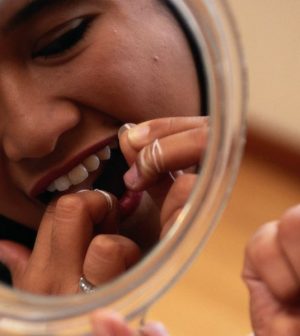- Could Your Grocery Store Meat Be Causing Recurring UTIs?
- Are You Making This Expensive Thermostat Error This Winter?
- Recognizing the Signs of Hypothyroidism
- 10 Strategies to Overcome Insomnia
- Could Artificial Sweeteners Be Aging the Brain Faster?
- Techniques for Soothing Your Nervous System
- Does the Water in Your House Smell Funny? Here’s Why
- Can a Daily Dose of Apple Cider Vinegar Actually Aid Weight Loss?
- 6 Health Beverages That Can Actually Spike Your Blood Sugar
- Treatment Options for Social Anxiety Disorder
Are You Ignoring Gum Disease?

Going to the dentist might not be a favorite on your to-do list, but these check-ups are important not only for your teeth, but also for your gums.
Gum disease, or gingivitis, can be difficult to catch. And it can lead to the more severe problem of periodontitis.
Of concern, periodontitis has been associated with more serious health issues, such as heart disease and diabetes, all of which share a common link — inflammation, explain experts at the American Academy of Periodontology.
Certain medical conditions and lifestyle choices make you more susceptible to gum disease. If you smoke, take medications that lead to dry mouth, have poor nutrition, or experience high stress, you’re more likely to develop gingivitis. If unhealthy gums run in your family or if you already have heart disease, diabetes or arthritis, you’re also at higher risk.
It’s important to know your risk level because most people don’t experience symptoms until their 30s or 40s, when the disease might already be at an advanced stage.
Warning signs of gingivitis are bad breath that won’t go away; red, swollen, sensitive or receding gums or gums that bleed easily; and sensitive or loose teeth that make chewing difficult.
To lower your risk of gum disease, brush your teeth and tongue after every meal. Floss at least once a day. And make a habit of using mouthwash to remove the bacteria that brushing and flossing miss.
Also, be sure to go for regular dental check-ups. If your dentist spots early signs of gum trouble, a visit to a gum specialist — a periodontist — might be needed for treatment.
More information
To learn more about the different types of gum disease, visit the American Academy of Periodontology.
Source: HealthDay
Copyright © 2026 HealthDay. All rights reserved.










